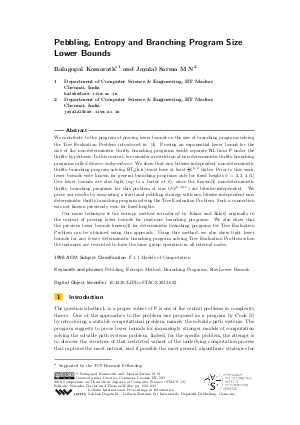Pebbling, Entropy and Branching Program Size Lower Bounds
Authors Balagopal Komarath, Jayalal M. N. Sarma
-
Part of:
Volume:
30th International Symposium on Theoretical Aspects of Computer Science (STACS 2013)
Part of: Series: Leibniz International Proceedings in Informatics (LIPIcs)
Part of: Conference: Symposium on Theoretical Aspects of Computer Science (STACS) - License:
 Creative Commons Attribution-NoDerivs 3.0 Unported license
Creative Commons Attribution-NoDerivs 3.0 Unported license
- Publication Date: 2013-02-26
File

PDF
LIPIcs.STACS.2013.622.pdf
- Filesize: 0.54 MB
- 12 pages
Document Identifiers
Subject Classification
Keywords
- Pebbling
- Entropy Method
- Branching Programs
- Size Lower Bounds.
Metrics
- Access Statistics
-
Total Accesses (updated on a weekly basis)
0Document
0Metadata
Abstract
We contribute to the program of proving lower bounds on the size of branching programs solving the Tree Evaluation Problem introduced in (Stephen A. Cook, Pierre McKenzie, Dustin Wehr, Mark Braverman, and Rahul Santhanam, 2012). Proving an exponential lower bound for the size of the non-deterministic thrifty branching programs would separate NL from P under the thrifty hypothesis. In this context, we consider a restriction of non-deterministic thrifty branching programs called bitwise-independence. We show that any bitwise-independent non-deterministic thrifty branching program solving BT_2(h,k) must have at least 1/2 k^{h/2} states. Prior to this work, lower bounds were known for general branching programs only for fixed heights h=2,3,4 (Stephen A. Cook, Pierre McKenzie, Dustin Wehr, Mark Braverman, and Rahul Santhanam, 2012). Our lower bounds are also tight (up to a factor of k), since the known (Stephen A. Cook, Pierre McKenzie, Dustin Wehr, Mark Braverman, and Rahul Santhanam, 2012) non-deterministic thrifty branching programs for this problem of size O(k^{h/2+1}) are bitwise-independent. We prove our results by associating a fractional pebbling strategy with any bitwise-independent non-deterministic thrifty branching program solving the Tree Evaluation Problem. Such a connection was not known previously even for fixed heights.
Our main technique is the entropy method introduced by Jukna and Zak (S. Jukna and S. Žák, 2003) originally in the context of proving lower bounds for read-once branching programs. We also show that the previous lower bounds known (Stephen A. Cook, Pierre McKenzie, Dustin Wehr, Mark Braverman, and Rahul Santhanam, 2012) for deterministic branching programs for Tree Evaluation Problem can be obtained using this approach. Using this method, we also show tight lower bounds for any k-way deterministic branching program solving Tree Evaluation Problem when the instances are restricted to have the same group operation in all internal nodes.
Cite As Get BibTex
Balagopal Komarath and Jayalal M. N. Sarma. Pebbling, Entropy and Branching Program Size Lower Bounds. In 30th International Symposium on Theoretical Aspects of Computer Science (STACS 2013). Leibniz International Proceedings in Informatics (LIPIcs), Volume 20, pp. 622-633, Schloss Dagstuhl – Leibniz-Zentrum für Informatik (2013)
https://doi.org/10.4230/LIPIcs.STACS.2013.622
BibTex
@InProceedings{komarath_et_al:LIPIcs.STACS.2013.622,
author = {Komarath, Balagopal and Sarma, Jayalal M. N.},
title = {{Pebbling, Entropy and Branching Program Size Lower Bounds}},
booktitle = {30th International Symposium on Theoretical Aspects of Computer Science (STACS 2013)},
pages = {622--633},
series = {Leibniz International Proceedings in Informatics (LIPIcs)},
ISBN = {978-3-939897-50-7},
ISSN = {1868-8969},
year = {2013},
volume = {20},
editor = {Portier, Natacha and Wilke, Thomas},
publisher = {Schloss Dagstuhl -- Leibniz-Zentrum f{\"u}r Informatik},
address = {Dagstuhl, Germany},
URL = {https://drops.dagstuhl.de/entities/document/10.4230/LIPIcs.STACS.2013.622},
URN = {urn:nbn:de:0030-drops-39709},
doi = {10.4230/LIPIcs.STACS.2013.622},
annote = {Keywords: Pebbling, Entropy Method, Branching Programs, Size Lower Bounds.}
}
